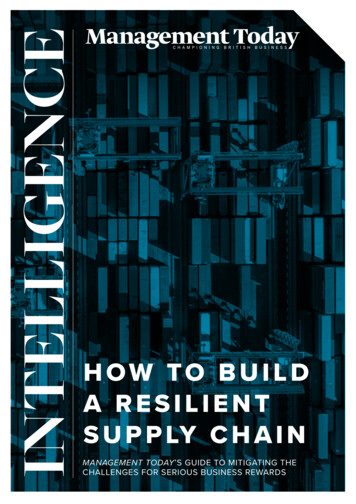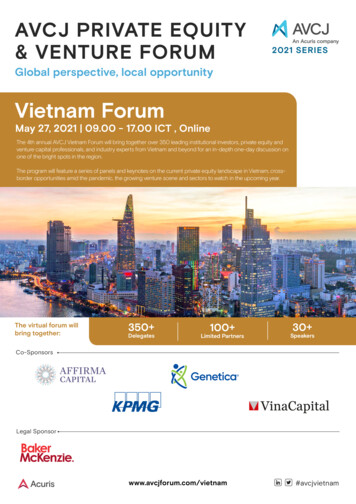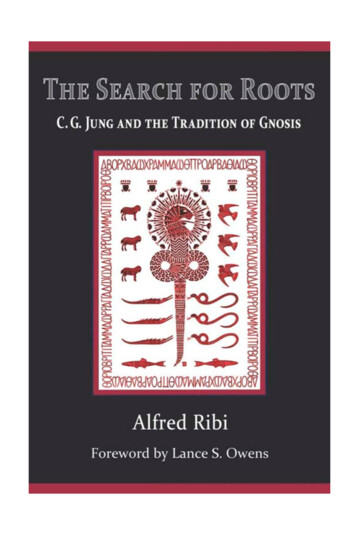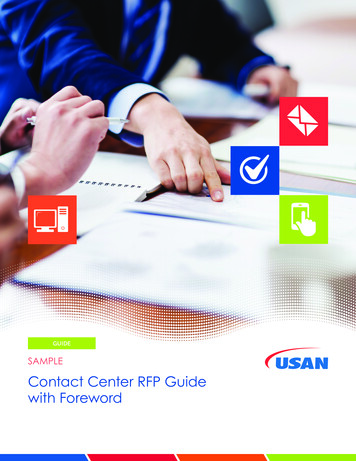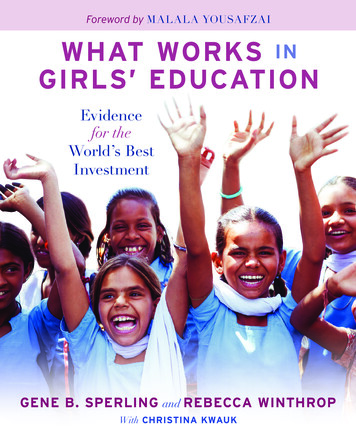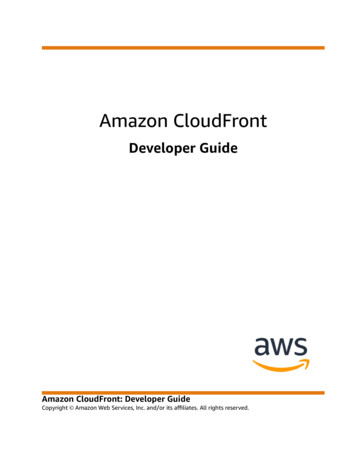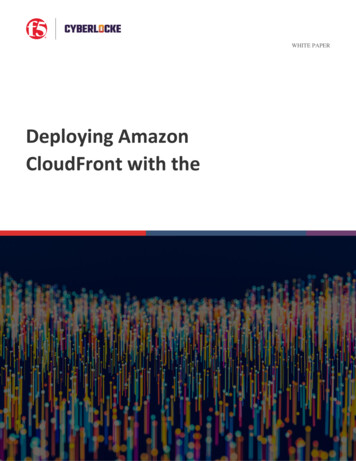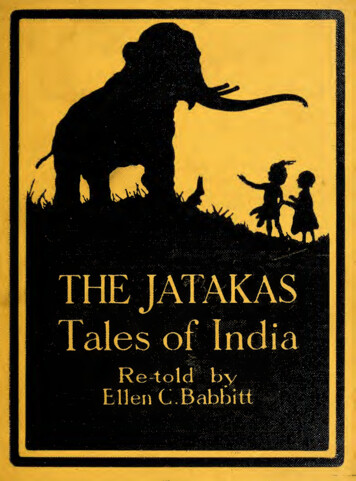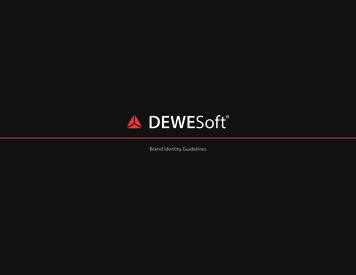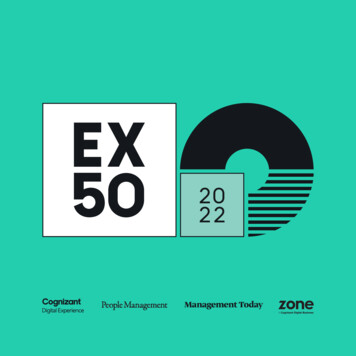
Transcription
ForewordBusinesses have long understood the value ofgood employee experience. But, over the pastcouple of years, several factors have combinedto make EX questions some of the most urgentones facing the C-Suite.Our list of 50 UK EX champions reveals thebreadth of issues that fall under the term.Frazzled employees, or those worried about losingtheir jobs, mean that mental health and financialeducation are now top priorities for leaders inHR and across the business.And so are issues around diversity, equalityand inclusion. The growth of the Black LivesMatter movement has led many to examine andunderstand their privilege and start to ask whatthey can do. DEI has also opened people's eyes tothe issues facing the LGBT community, and theterm is rapidly expanding to cover other aspects,such as neurodiversity.Perhaps facing a virus that can affect all of us hassparked a feeling of common humanity. Buildingworkplaces where everyone feels welcome nowfeels like an uncontroversial but urgent aim.That’s not to say that this is all about ‘doing theright thing’. All of these concerns dovetail witha more prosaic need: keeping employees.2We all know that happy workers are less likelyto leave an organisation, and EX is a key factorin retention. As the economy changes, someemployees see greener grass elsewhere, andpersuading them to stay, whether that is withmore pay, better parental leave, or betterwork-life balance through hybrid working,is a priority for all organisations.What’s more, EX is strongly linked to customerexperience (CX); after all, your employees arethe ones delivering your customer experience.As EX challenges rapidly come to the fore, ourEX50 champions are creating the future of work.GEORGANNA SIMPSONHead of Content, Content LabsHaymarket Media Group(Publishers of Management Todayand People Management)
Our ApproachThe EX50 is a list of individuals who areproviding outstanding employee experiencein their organisations or actively workingto prioritise and transform their EX.These days, the way organisations treat theirpeople is just as important to their reputationsas the quality of their products. A plethora ofresearch shows that happy, engaged employeesare more productive and less likely to leave anorganisation, and that potential employees aremore likely to apply for jobs at companies witha reputation for valuing their people.Customers have been known to boycott firmsthat treat their employees badly, and wouldmuch rather spend their money with companieswho respect their people. Employee experienceis no longer about just being nice, it is also abottom-line issue.Our list consists of 50 individuals who are drivingtheir organisations to put employee needs first,in a way which helps their organisations achievetheir business objectives and fulfil their purposes.3
Our CriteriaThe individuals on our list exemplify one or more of the following principles: V ISION – they have a clear vision that alignsto their organisation’s brand, culture, purposeand goals to enable their people to flourish.They engage and collaborate with all employeesand stakeholders so that employees cancontribute and shape that vision and feelinvested in their work. VALUES – they create a culture that fosterscreative, collaborative work, which is bothfulfilling for individuals and is aligned withorganisational objectives. They nurtureenvironments animated by the values oflearning, growth, belonging and fulfilment. I NCENTIVES AND REWARDS – they adequatelyand transparently incentivise and rewardemployees. They have fair and inclusivemeasures in place, support employees toachieve them and generously reward andrecognise their people. INNOVATION – they create a culture thatencourages creativity and new thinking.They embrace ground-breaking technologiesand ideas that help employees to excel. DIVERSITY AND INCLUSION – they value andpromote diversity, inclusion and an equitableworkplace, not only because it is the rightthing to do, but also because they recognisethat more diverse and inclusive organisationsperform better and become stronger. FLEXIBILITY – the way we work has changedover the past 18 months, and many employeeswant some of those new ways of working tostay. The individuals on our list recognise thisand are helping to shape the hybrid workplaceof tomorrow.4
WELCOME TO THE INAUGURAL ANNUAL EX50EX50The people-leaderscreating the workplaceof tomorrowIt’s no secret that great employee experience (EX)is good for business. In 2021 we commissioneda study with Forrester which shows that theefficiencies created through enhanced employeeexperiences allow staff to focus their energies onbetter serving customers, with 64% realising orexpecting increased revenue.Yet many organisations are underinvesting inemployee experience. Only 29% of businessescompletely agree that their company’s visionfor improving customer experience (CX) includesimproving employee enablement. And astaggering 58% of CX managers and executivesreport that their CX success is hindered by notinvesting enough in employee enablementimprovement efforts.¿That’s why we’ve partnered with PeopleManagement and Management Today to createthe EX50 – a list of the leaders in employeeexperience who are on the journey to getting itright. This group of professionals understand thathappy, engaged employees are more productive, andthey have helped to create a positive culture andefficient ways of working within their organisationsto not only drive talent attraction and retention, butalso directly impact customer experience.Congratulations to them all!¿A ‘ ctivate A Holistic Customer Experience cE osystem toBecome A Market Leader’, Forrester eR search Inc, April 20215
At Zone, the experience consultancywithin Cognizant Digital Experience, webelieve EX is critical to achieving your CXambitions. We know you can’t look at onewithout the other – so our methods focuson employee experience as one layer ofthe whole customer experience.The EX50 members understand these principlesand have been selected against key criteria,which is detailed in the Our Approach sectionof this report. We hope that by reading aboutthe achievements of these impressive individuals,it will inspire you to consider your own employeeexperience strategies.We believe there are three fundamentalelements to consider when embarkingon an improved employee experienceacross your business – we call this the3Ms to success: M INDSETS: Having a clear vision thataligns to your brand purpose, employervalue proposition and what you wanteveryday life to feel like for youremployees so they can do their best work. METHODS: Implementing the rightoperational procedures, ways of working,environment, behaviours and culture foremployees to thrive and deliver. M EASURES: Setting the best measures toindicate business health and introducingincentives that drive the right behavioursfor your employees.6PATTI ALDERMANAVPDigital Experience, Zone and Cognizant
How do we really drive the diversitylens? How are we going to drive a moreinclusive culture and an environment whereeverybody feels safe and included?SALLY AUSTIN, WINCANTON
SINCE SHE STARTED AT LOGISTICS ANDsupply chain firm Wincanton, life has been “arollercoaster” for Sally Austin, with the pandemic,Brexit-related labour issues and the HGV drivershortage proving major challenges. Overall,though, her focus has been working to increaseD&I in a traditional, male-dominated industry.SALLYAUSTINChief PeopleOfficerWincanton8“I had to take a step back and say, okay, what’sreally important to our organisation?” she says.“And how do we really drive the diversity lens?How are we going to drive a more inclusive cultureand an environment where everybody feels safeand included?”The company recently held its first D&Iconference; has initiated mystery Zoom callswhere people talk about their experiences ofdiscrimination and bias, mental health issues andsuicide; set up support networks; and encouragedcolleagues – such as the small number of femaleHGV drivers – to tell their stories.Change is happening. In the past 12 months,gender representation across the group hasincreased from 18% to 21%. In management roles,female representation has increased from 18% to23%, and the main board reached a 50/50 genderbalance earlier this year. “We’re making progress,but I feel that I am only halfway done, and the realmomentum has just begun,” says Austin.
LUCY BECQUEChief People OfficerCoventry Building Society“IN SOME WAYS, WE’VE BEEN IN A LUCKYposition that we’ve had a wellbeing programmegoing for four years, so we weren’t struggling tobuild something from scratch at the start of thepandemic, we were adapting what we alreadyhad,” says Lucy Becque.Coventry Building Society already offered abroad-ranging programme, including physicalhealth, access to a digital GP 24 hours a day,and help with sleep and mental health. Thelatter, of course, “has never been more importantthan in the past 18 months,” says Becque, andthe company trained over 200 managers tounderstand more about it during the pandemic.Being good with money, the organisation alsofocused on financial wellbeing, which is oftenclosely linked to mental health, says Becque.In addition, it did work around the menopause,and has recently signed up to the pregnancy losspledge, offering up to four weeks’ paid leave tocolleagues (male or female) dealing with it. Paidcarers’ leave has also been increased. It has alsoset new targets around representation in terms ofgender and ethnicity.One big change has been the use of Yammerto get employees to tell their stories. “We’ve nowgot much more of a focus on lived experience,rather than trying to manage all of this centrally,”says Becque.9
KERRY BEIRNEGroup People and Learning DirectorThe Sovini GroupTHIS YEAR THE SOVINI GROUP WAS VOTED THEUK’s Best Workplace for Women for the fourthconsecutive year in the Great Place to Work list.The Merseyside-based construction, propertyand facility services group has a gender paygap of -6.2%, meaning that female employeeson average are paid more than male employeesat the organisation. The firm puts this downto its commitment to work-life balance, andfairness around pay, recognition, training anddevelopment opportunities.Its Group People and Learning Director, KerryBeirne, has said: “Sovini is an inclusive employer,with equality at the heart of our culture. Ourcommitment to fair and equal pay remainsstrong, as we strive to be industry leaders in thearea of gender pay.”10
IT’S NOT EVERY EMPLOYER THAT CAN OFFER FREEtickets to England football games at Wembleyas a perk, but for The FA that comes as standard.While they were working at home, FA staff alsoreceived mail drops, including advent calendarsat Christmas, spring sunflower packs and tea andchocolate to mark Time to Talk Day, a day whereeveryone was encouraged to take some timeaway from their desks and connect with friends,family or colleagues.“These have been really well-received and,while they’re just little gifts, they can make areal difference to people feeling valued andconnected to colleagues and the organisationas a whole,” says HR Director Rachel Brace.The FA is also a very welcoming and diverse placeto work, with especially strong representation ofgay women. It partnered with Stonewall to delivera series of workshops around LGBT role modelsand allies, and marched at Pride in London forthe first time in 2019.RACHELBRACEHR DirectorThe FootballAssociation11
THE PANDEMIC SEEMS TO HAVE CATALYSEDchange at The Royal Mint. At the height of thefirst wave it pivoted to making nearly two millionvisors for NHS staff, something that reinforced theculture of “passion and purpose”, says HR DirectorSarah Bradley, and tied it to the community at atough time.Since then, D&I has become huge for the1,000-year-old, 800-person institution. “I thinkthe pandemic’s really opened up people totalking more and more about it,” says Bradley.“We’ve got diversity and inclusion champions,and groups talking about mental health, ethnicdiversity, cultural differences and LGBT issues.We’ve also got mental health first aiders.“Our leaders have engaged, and reallyunderstand that they are accountable.Two hundred managers went through diversitytraining in the space of two months.”SARAHBRADLEYDirector of HRThe Royal Mint12Bradley herself was recently diagnosed withADHD and is keen to broaden the conversationto talk about neurodiversity and otherdifferences. “I know anecdotally that wehave a lot of people on site who have eitherneurodiversity or physical disabilities,” she says.“We’re trying to build confidence for people tospeak out about this and to be able to knowwhere they can go and get help. We have startedconversations, and they are just going to go onand on.”
Our leaders have engaged,and really understand thatthey are accountable.SARAH BRADLEY, THE ROYAL MINT
HAVING BEGUN HIS CAREER RUNNING PUBS,the strand running though Stuart Branch’s careerhas been a strong people focus. At Weetabix,he worked hard to ensure that all employeesunderstand the business objectives, and arealigned with the company’s commercial projectso that their work has “purpose and meaning”.Branch says he is committed to building skillsand ensuring that people are self-motivated andfocused on the business’s core aims as it launchesnew products and expands into new markets,such as China.“Our quest is to continue to make Weetabix agreat place to work,” he says, adding that hisphilosophy is to “invert the pyramid” of thetraditional top-down management structure,ensuring managers are focused on their teams,and not their own managers.14STUARTBRANCHChief People& Digital OfficerWeetabix
VIRGIN MONEY RECENTLY ANNOUNCED A NEWbenefits package for all employees, which willoffer them five ‘wellbeing days’ a year, on topof their 30 days of holiday. When added to bankholidays and the ability to “buy” more days off,employees can spend nearly 50 days away fromwork per year. In addition, the firm said that itwill offer new parents 20 weeks of leave, and 52weeks overall.The new approach is “a clear demonstrationof that purpose, underlining our commitmentto providing a first-class colleague experiencethat we know will translate to a differentiatingexperience for customers,” says SyreetaBrown, the new Group Chief People& Communications Officer.The new scheme, called A Life More Virgin,also reacts to the trend for flexible working.All employees whose job is not dependent ona specific location will be able to request to workanywhere in the UK, and new jobs that do nothave to be located in a particular place will alsobe open to anyone in the country.SYREETA BROWNGroup Chief People & Communications OfficerVirgin Money15
AS A PUB COMPANY, GREENE KING WAS HIThard by the pandemic, with 99% of its stafffurloughed. To eliminate worry, the companytopped up all staff’s pay to 100% – includingthose who had joined too recently to qualifyfor the government scheme. It also providedfood and retail vouchers to staff in need. Thirtythousand of its people accessed the Wagestreamapp, which allows users to receive a portion oftheir wages before payday.The pandemic “shone a spotlight on mentalhealth”, and Greene King has strengthenedits support in this area, also introducing lifeinsurance for all staff earlier than planned.“From a people and culture perspective, therehave been a few key changes to our employeeoffer, which have either been accelerated orchanged as a result of Covid,” says Chief PeopleOfficer Andrew Bush. “First, we have introducedan agile working policy – something that wasalready in the plan, but Covid meant we havefast-tracked the launch. This is working reallywell for our office-based teams.”It seems the change is only just starting.Bush says that the company is “on a culturaltransformation”. D&I is a focus, with all boardmembers now reverse-mentored by a BAMEstaff member, and the firm is looking to improveits reward strategy in order to become “the mostattractive employer in the sector”.ANDREW BUSHChief People OfficerGreene King16
JO BUTLERChief People OfficerAsos“OUR PURPOSE AT ASOS IS TO GIVE PEOPLE THEconfidence to be whoever they want to be, andthat holds true for our staff as well,” says ChiefPeople Officer Jo Butler. “Our focus is on buildinga working environment and culture that supportsour employees to develop and grow, which helpsthem balance their lives in a way that works forthem, allows them to be their authentic selvesand makes them feel connected to Asos througha shared purpose and values.”To further these noble aims, Asos aims to haveover 15% ethnic minority representation acrossthe leadership team by 2023, and 50% femalerepresentation, to reflect UK demographics.In 2021 the company also launched a 13-monthFuture Leaders development programme,prioritising the 200 ethnic minority womenin mid-level roles across the business, with 140having started the programme by January 2022.It is also aiming to recruit more women into itstechnology departments, with the goal of havingmore than 40% of female representation inEngineering, Product and Science roles by 2030,up from 20% currently.
Our focus is on building a workingenvironment and culture that supports ouremployees to develop and grow, which helpsthem balance their lives in a way that worksfor them, allows them to be their authenticselves and makes them feel connected toAsos through a shared purpose and values.JO BUTLER, ASOS18
STEVE COLLINSONHead of the People TeamZurich UKINSURANCE FIRM ZURICH HAS A HOLISTICWellbeing Framework that provides its people“with the tools and resources needed to stayhealthy and empowered” and “to grow in the fourdimensions of wellbeing – physical, social, mentaland financial”.It also offers 16 weeks of parental leave to all newparents after the birth of a child. While around 1%of new fathers take up the government’s parentalleave scheme, since the initiative launched in 2019,over two thirds of new fathers have taken up theoffer at Zurich, and one in five of those have beenin senior roles. That adds up to 300,000 hours offamily time. “It’s 2020, family life has moved on,and our approach as employers must too,” saysHead of People Steve Collinson.During the Covid crisis, Zurich also introduced‘lockdown leave’, allowing parents and othercarers who worked for the firm in the UK to takeup to 10 days’ paid leave to help them deal withthe closure of schools. The firm said that 20%of its 4,500 employees potentially benefitedfrom the offer.19
“THE PANDEMIC HAS REALLY TAUGHT US THAThow we work is more important than where wework,” says Nationwide’s People Director, TracyConwell. In March 2021, Nationwide announcedits Work Anywhere approach, letting its 13,000office-based employees decide where they wantto work from.People are using their time in the office differently,says Conwell, “whether that’s for collaborationwith others, meeting their teams, or even justproviding a change of scenery. Fundamentally,this is about choice and trust, and we continueto see our people doing their jobs incredibly well –wherever they work.”Flexible working has been especially welcomedby those with parental and caring responsibilities,or specific accessibility needs.“These are areas we constantly monitor from aninclusion perspective. It also broadens our accessto talent when it comes to recruitment – we areable to hire people who live further away from ouroffices, which is aimed at driving greater diversityof our workforce.”TRACYCONWELLPeople DirectorNationwideBuilding Society20
ICHARDRCROSSChief HR OfficerL’Oréal UKand IrelandL’ORÉAL SAYS THAT EMPLOYEE EXPERIENCE HASalways been at the core of its operations, andthat it has flexed over the past year to ensure itresponded to individuals’ needs. With many staffat home, the company pivoted to offering virtualtraining, talks and workshops.It also offered specific training around mentalhealth, a wellbeing app and an employeeassistance programme. Its new myHYBRID policyprovides a framework to ensure everyone is“enabled and empowered to embrace hybridworking and benefit from flexibility”.“We believe in a balance of both office andremote working, to build togetherness and driveinclusion,” says Chief HR Officer Richard Cross.“Team workshops and a new meeting charter willenable everyone to make the most of our hybridmodel and are designed to improve our ways ofworking together to make this a success.”The HR function is also committed to diversity,equity and inclusion; for example, it recentlyintroduced new guidance and training to supportand educate all employees on the topic ofmenopause and perimenopause.21
AMANDA CUSDINChief People OfficerSageTYNESIDE’S BIGGEST EMPLOYER, ACCOUNTINGand audit tech firm Sage doesn’t just usetechnology in its products, it’s at the cutting edgeof using AI and automation in its evaluation ofemployees, too.Performance management now uses automatedforms, which has hugely reduced the time spenton the task. Over the past three years, CPOAmanda Cusdin has also overseen a diversitydrive. During Covid, Sage has recruited 4,000people, and Cusdin has had to navigate a newworld of remote onboarding and hybrid working.This has all been part of a transformation ofthe culture at Sage. “We talk about creating aculture where our colleagues can thrive, and thatis what we seek to do in all of our ways of workingand the way we train and develop managersand recruit managers,” Cusdin has said. “Butalso we recognised that we needed to createan environment where people could bring theirwhole selves to work and be open and honest,and this also meant being open and honestwhere people were suffering and needed helpand support.”The results are positive. Attrition has reduced by7%, hiring time has been cut dramatically, andthe employee net promoter score is up 57 points.In this fast-moving industry, though, perhaps thebest sign that Sage is getting it right is that 40%of vacancies are now filled by internal candidates.22
JEFF DODDS CHAMPIONS DISABILITY EQUALITYand has spearheaded Virgin Media’s partnershipswith disability equality charity Scope, TheValuable 500 – a global movement that aims toput disability on the business leadership agenda– and the British Paralympic Association. He isalso a board member of The Valuable 500 andis Non-Executive Director for the Department forLevelling up, Housing and Communities.In addition, Dodds previously sponsored VirginMedia’s ‘Belonging’ diversity and inclusionstrategy, and he is the driving force behind thecompany-wide roll-out of the ‘Equity Sequencing’training programme, which is helping VirginMedia O2 to create projects, programmes andplans that are inclusive of all its employeesand customers.Prior to Virgin Media’s merger with O2, Dodds wasthe board executive responsible for disability.He oversaw the company’s initiatives to supporta million disabled people with the skills andconfidence to get and stay in work; to become amore inclusive company for disabled people; andto encourage other businesses to become moreinclusive employers of disabled people.Dodds is working closely with Chief PeopleOfficer Philipp Wohland and other boardmembers to “retain and build on this workto ensure that the new business is a leading,inclusive, and equitable employer”.Following the merger of Virgin Media and O2,JEFF DODDSChief Operating OfficerVirgin Media O223
ANDYDODMANChief HR OfficerLeeds CityCouncilHOW DOES AN HR PROFESSIONAL APPROACHthe increasing digitisation and automationof work? That’s a constant question for AndyDodman, formerly head of HR (before becomingCOO) at The University of Sheffield, and Chair ofthe Russell Group HR Directors Forum, and now incharge of HR at the UK’s second-largest council.24Leeds City Council is involved in a digitisation ofits services, which has led to significant changesin demands on employees. A large part ofDodman’s work is understanding how trends likeautomation impact on the wellbeing and healthof employees. Partly this is about ensuring thatpeople have the skills to use new tools, but hesays it’s also vital to ask employees what will makea real difference to them.HR plays a “key role” in ensuring thatemployees have the skills to carry out theirjob in an organisation that is using more andmore technology, says Dodman. The function isconstantly “thinking about where digitalisation fitswithin that whole employment life cycle,” he adds.He continues: “I think we’re already quite familiarwith the idea of technology playing a key rolein bits of the employment life cycle, in terms ofrecruitment, online learning and development,and induction onboarding, but we want tobroaden that out and make sure that we havethat integrated system right across the lifecycle, really playing a key part in the employeeexperience of our staff.”
AMY GRIEVESOrganisation Development Lead –Consumer HealthcareGlaxoSmithKlineEMPLOYEES AT SOME COMPANIES STRUGGLEto grasp their work’s purpose. Not so at GSK,which, along with other healthcare companies,has seen the benefit of what it does madeexceptionally clear over the past couple of years.“I think in its simplest, most formal way, employeeexperience is about the perceptions employeeshave about the experience they’re having atwork, across all the interactions they have withtheir employer,” says Amy Grieves, OrganisationDevelopment Lead, Consumer Healthcare.“In practice, I think I really work to the definitionof creating an environment where people can betheir best selves and do their best work, in serviceof the purpose and the strategy of a company.And that’s where it starts to get challenging –because that then starts to incorporate all sortsof things. You start to get into the world of culture,employee value propositions, employer brands,you start to look at organisational effectiveness –and so it goes on.”This isn’t just about being nice for the sake of it.Good employee experience, says Grieves, is coreto productivity and brand advocacy, which havea direct effect on productivity and growth. Whenthe aim is saving millions of lives, it could hardlybe more important. “To create that environmentwhere people can thrive is what I’m aiming to do,”she says.25
UNDER DANIELLE HARMER (DANNY FOR SHORT),diversity and inclusion has become an evengreater focus for insurance firm Aviva than italready was. In order to help close the firm’sgender pay gap, she announced that from 2020all roles would offer flexible working, which isexpected to increase applications from women;that all shortlists would be gender balanced;and that the firm would use the Textio softwareplatform, which claims to help create genderneutral job adverts.DANNYHARMERChief PeopleOfficerAviva26Harmer was named in the OUTstanding 50 AllyExecutives List, and is Co-Executive Sponsor ofAviva’s Pride Community. The company is alsoembracing new areas of diversity, launchinga placement programme designed to attractneurodiverse individuals, and it has given severalneurodiverse interns 12-month placements in thecompany’s Quantum data science practice.Aviva also recently launched GAIN, the Group forAutism, Insurance and Neurodiversity, which aimsto highlight the advantages and opportunitiesof a neurodiverse workplace. In addition, Avivaoffers generous parental leave, with 84% offathers taking six months off when their child isborn. Under Harmer, Aviva has embraced hybridworking, and says that 95% of its 16,000 UKworkers would like to work flexibly in future.
LIEUTENANT ALEXANDRA HEADTraining Management OfficerRoyal Navy Training Management GroupIN MOST CIRCUMSTANCES IT’S NOWconventional wisdom that leaders should bediverse, compassionate and patient. But arethose qualities valuable in the navy? They shouldbe, says Lieutenant Alexandra Head, who hasoverseen the updating of a 12-week trainingprogramme delivered to 200 officers a year,which had been almost unchanged for 70 years.Having run the Royal Navy’s at-sea training forofficers – known as Common Fleet Time – for ayear and deciding that it was old-fashioned andnot up to scratch for the modern world, Headapplied to overhaul it. “As part of that role, oneof my jobs was collating feedback from peoplewho were either leaving or just generallyunhappy,” says Head. “One thing that consistentlyOut went copying out passages from old booksand face-to-face interviews, and in came animmersive onboard learning experience, anonline portal, and a scenario-based assessment.“We’re trying to encourage people to think aboutL&D on a daily basis, so they can improve theirpersonal portfolio and gain transferable skills,”says Head. “This will make them more employableoutside of the navy: helpful when the time comesfor them to move on.”came up was that our initial workplace trainingwas falling short of the mark. Young officers weresaying they felt it wasn’t good for professionaldevelopment and the way that it was done madethem feel undervalued.”27
We’re trying to encourage peopleto think about L&D on a daily basis,so they can improve their personalportfolio and gain transferable skills.LIEUTENANT ALEXANDRA HEAD,ROYAL NAVY TRAINING MANAGEMENT GROUP
HAZELHENDLEYHR DirectorOrdnanceSurveyLOCATED ON THE COAST, SOUTHAMPTON-BASEDOS was challenged by only having a semi-circularregion where people could commute from. “Withan ambitious growth agenda underway, we werestruggling to attract sufficient talent in someof our technical disciplines,” says HR DirectorHazel Hendley. But when Covid struck, they hada revelation. “We realised that we could be asefficient and effective working from home, andnow we are recruiting from throughout the UK,”says Hendley. “We have added nearly 400 newroles to the business since April 2020.”The question then became, how could they fostera great employee experience? “We’re exploringthe idea of creating regional hubs to allow peopleto connect with colleagues and customers,”Hendley explains. “This also enables us to tar
to make EX questions some of the most urgent ones facing the C-Suite. Our list of 50 UK EX champions reveals the breadth of issues that fall under the term. Frazzled employees, or those worried about losing their jobs, mean that mental health and financial education are now top priorities for leaders in HR and across the business.
